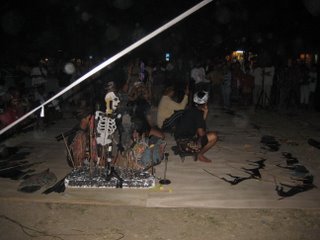Ubud Writer's and Reader's Festival


A few months ago, I read in a tour book about the Ubud Writer’s and Reader’s Festival, a four day international event held in Ubud,
The first session we went to was called “After the Wave” and it was about the ongoing process of rebuilding and recovering after the December 2004 tsunami. First they showed the photographs of John Stanmeyer, a famous photographer who had taken pictures at various sites in Aceh (the province hit most severely by the wave) right after the tsunami and then one year later. It was really striking to see the photos juxtaposed next to one another—for example, one was of children running across a field to get food and supplies from an aid helicopter, and the second (or “after”) picture was of children running across the field again, but this time simply chasing after the ball they were playing with. Some of the other pictures featured freshly dug graves; then a year later, the same spot overrun with grass and flowers.
After the photos, two Achenese poets read some of their work. The first poet, Fozan Santa, had written a series of poems labeled “Black Water” about the tsunami. I could only understand the translations, which were fairly simple, but the poems were much more rhythmic in Bahasa Indonesia. The second poet, Reza Idria, read only one poem, also about the tsunami. Both of the poets talked about how, after the tragedy, they saw their focus in writing shift away from the conflict in Aceh and toward rebuilding. Prior to the tsunami, for 29 years Aceh had been experiencing severe civil unrest as the province attempted to split from
The moderator asked if Fozan thought the peace had come about as a result of the Achenese pulling together after the tsunami. He very honestly answered that no, he thought that having the attention of the world focused on Banda Aceh for the tsunami aid efforts simply made it impossible for the government on either side to continue their bloody war against one another. I thought both poets raised some excellent points about foreign aid to the victims as well as the role of writers in portraying the feelings of their people. Recently, the head of a giant company responsible for rebuilding much of the province was taken hostage by disgruntled survivors whoaren't pleased with the pace of the rebuilding process. The poets saw events like that as the reason they must continue to write for their province.
After the Achenese poets spoke, the attention turned to Elmo Jayawardena, the head and founder of the Sri Lankan organization AFLAC (The Association for Lighting a Candle). After the initial shock of the disaster wore off in January of 2005, Elmo started AFLAC for orphaned children. He told one story about a boy he found by the shores of
“This boy’s father had been swept away in the tsunami, and his mother had been driven mad by the tragedy. He was a little boy, only six years old, with two younger brothers to care for. Every time I looked at him in January, he just cried, and cried, and cried. In April, when we went back to monitor the programs and check on the progress, we saw the little boy again. And every time you looked at him, he just cried, and cried, and cried. And that is the tsunami.”
The quote for Elmo’s association is: “It is better by far to light a solitary candle than to curse the darkness.” His individual work in creating the organization, which also works to teach swimming to poor Sri Lankans who live by the coast, is really a testament to that motto. I found him an incredibly inspiring and kind man, and I talked to him briefly after the session about teaching English as a foreign language.
The second session was a panel discussion about the emerging role of
The third and final session we attended was called “Footprints Across the Globe” about travel writing. It was interesting in some ways, but I don’t think I would read the books of a few of the panelists. After the session was over, we found our way to some sort of book launch/singing/free wine and food event down the street. Some Australian woman was launching her book and CD, both of which looked pretty terrible, and then she drunkenly bellowed some of her own songs into the microphone. Delicious.
As it started to get dark, we made our way to the Ubud Soccer Field for “Skateboard Wayung Kulit” apparently a modern interpretation of the Indonesian puppet show. It was hysterically funny. Someone must have told the puppeteers that there were foreigners in the audience, because they pretty much yelled out any English word they knew at any point. There would be strings of Indonesian, and then “COCA-COLA!” More Indonesian, then “WE MUST DRUNK.” I couldn’t follow any of the storylines, but there was certainly no skateboarding involved—there were, however, some massacre scenes featuring wild animals and lots of hooting and yelling from the audience.
For the last event of the night, we went to Warung Opera for some kind of Indonesian poetry slam/gamelan music/chanting. I missed the first hour because I was so entranced by Skateboard Wayung Kulit, but I did get to see some funky music and chat up a really interesting dude, Bob, at the bar. Bob is about 60, has lived for twenty years in

1 Comments:
thank you, Ceiltic
Post a Comment
<< Home